Source: Notes on Arab Orthodoxy
October 6, 2015

[The Gospel] speaks to us about our love for all, even our enemies, and makes love something that does not seek anything in return when it says "be merciful even as your Father in heaven is merciful."
Christianity is merciful. We must realize its essence in order to make use of it, for it not to remain just a slogan, something we brag about in front of people. The question posed to us every day is: what is the source of our love? By what power are we able to love? It is not within us foundationally, since man tends toward ruthlessness and revenge. Man is hostile and hostility is ingrained in us. Man is inclined to antagonize people and the Lord asks of us something beyond nature. He insists that we love and that we love always, the we love our enemies. He tells us that it is possible, but not from the dust from which we were shaped. It is, however, possible from the Holy Spirit if it flows upon us from His bounty.
Christianity alone teaches love. You can wander all over the world and read all the books and teachings, but the Gospel of Jesus Christ alone is what has revealed love in all its great dimensions that we know. It is what made love unconditional-- that is, independent of people's emotions. Jesus says to love people whether they love you or hate you. Your love is not focused on flesh and blood or people's emotions. Love is not from you or from them. It comes from your Father in heaven. Love is possible in Christianity alone. Elsewhere there is compassion and mercy. In the Gospel of Jesus love is perfect, constant, unceasing. Love comes to us from God's heart and it remains in us as long as God is in our hearts.It is what changes the face of the world and that to which the world aspires. It is the end of everything. If someone obtains it, he does not strive for anything else. The development that people talk about, the advancement that they seek, has the goal in the end of people living in love. If we realize love, we have arrived at the goal of human development and advancement and we have no need for anything else.
"Love one another as I have loved you." This is the secret of the entire process: "As I have loved you." That is-- I have loved you unto death. I have revealed to you that God is love and that if you are in Him, then you love. But if He is hidden from you or if your sins have hidden Him from you, then you are not able to love. Love found its perfection in Christ's death. A person who as faith in Christ's death, in His perfect sacrifice, then this is a person who loves because he knows that the other person before him is weak and in need of treatment.
Since Christ is the Physician of humankind, He made those who belong to Him physicians for people. If a sick person is brought to a physician, the physician might not know his name. He might not see his face and ask about his identity, his religion, his race, or his background but he has before him a sick person that he treats. Then another sick person comes and he treats him with the same care and attention. In this way each of us is a sick person. Each of us is spiritually sick and the other person, the person in front of us or near us-- our neighbor, our friend or our enemy-- has been appointed a physician by God to give him attention and care. So it does not matter for us whether or not they spoke ill of us, whether or not they beat us, whether or not they treated us unjustly. The person before us was put there by God for care. Love in Christianity is care.
Christ came to save people but He wants each one of us to follow up on the mission of salvation, to be a savior to those around us. Christ is not only active from heaven: all of us are His hands and His eyes and He has given us the Gospel so that within us and at our hands it will become a glorious reality. In this way, if we love people, then they feel that God loves them. We love so that people may draw near, not only to us but to God. We do not love in order to be loved ourselves. We love so that God may be loved.



